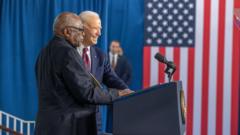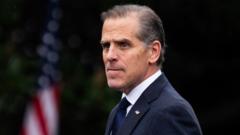Amid concerns surrounding the older leadership of the Democratic Party, including President Biden and Congressman Clyburn, party members are increasingly calling for the infusion of youthful energy and new perspectives. This introspection follows a disappointing electoral cycle and emphasizes the necessity to engage younger voters and candidates.
The Age Dilemma: Democrats Seek a Balance Between Experience and Youth

The Age Dilemma: Democrats Seek a Balance Between Experience and Youth
As age-related concerns grow within the Democrat Party, members grapple with the need for generational change while honoring their seasoned leaders.
For over three decades, Congressman Jim Clyburn's annual "world famous fish fry" has been a highlight for the Democratic Party in South Carolina. However, in light of recent electoral setbacks and an aging leadership, there’s growing discourse on whether the party should embrace new traditions and younger faces.
Clyburn, 84, who played a pivotal role in Joe Biden's 2020 campaign, has remained a stalwart supporter of the 82-year-old president. Despite questions about Biden's health, amplified by his recent stage 4 prostate cancer diagnosis, Clyburn remains firm in his resolve to lead. The landscape has shifted since he endorsed Biden, as the party now grapples with whether to lean on its aging figures or pivot towards fresh leadership.
Many Democrats are voicing a sentiment of urgency about the need for younger voices. Ashley McIntyre Stewart, a participant at Clyburn's fish fry, encapsulated this mood with a straightforward declaration: "We have a geriatric problem." This frustration is fueled by the deaths of three congressional Democrats this year, which has underscored the vulnerability of their current majority and facilitated the passage of Republican agendas with narrow margins.
Despite his age, Clyburn contests critiques about stepping down, asserting, "Every one of them said to me, please don't leave." He emphasizes the importance of focusing on improving the lives of future generations over concerns about his longevity in office.
The challenge lies in the fact that many within the party, historically favoring experience gained over decades, are now contemplating their direction. A recent Axios survey reveals that over half of House Democrats over 75 plan to run for re-election, Clyburn included, indicating a steadfast commitment to current leadership.
Amid this backdrop, there is a call for a rejuvenated Democratic youth movement. Activists recognize the necessity of involving a broader spectrum of backgrounds to energize the party and bring about electoral victories. Some younger candidates have begun challenging established politicians, reflecting a desire for change in the party's dynamics.
At the fish fry, two Democratic governors, Tim Walz and Wes Moore, addressed the gathering. Each speaker highlighted their commitment to energizing the party, with Moore, at 46, drawing applause as he declared, "This is our time. This is our moment." While Clyburn might be rooted in the past, the enthusiasm of younger leaders signals a potential shift on the horizon.
With the next presidential nomination cycle approaching, South Carolina will likely become a focal point in determining the face of the Democratic Party. Fundamental discussions about balancing age, experience, and youthful innovation mark the road ahead for Democrats trying to regain ground in a political landscape reshaped by recent electoral experiences. The distinct answers on how to navigate these waters will play a critical role in shaping the party's immediate future.




















